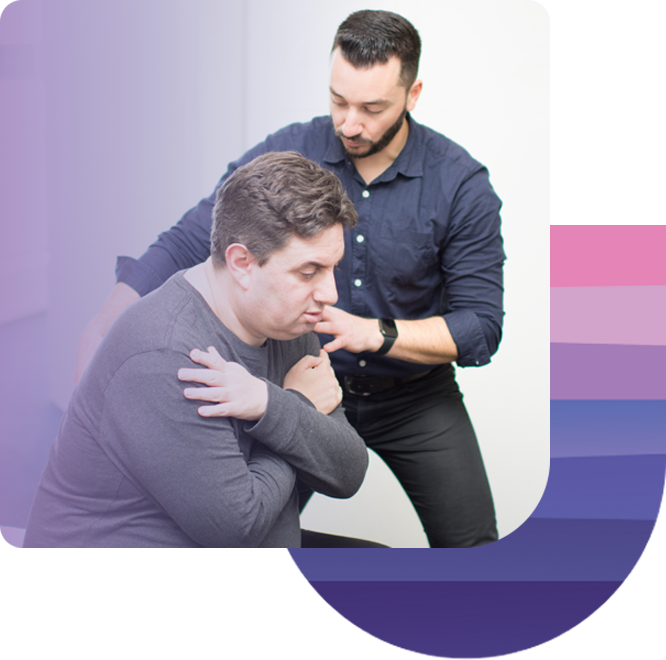Your Condition
Advance Therapy provides allied health services for participants with a chronic health conditions or disabilities. These conditions can impact individuals in a variety of ways.
On this page, we aim to explore the various conditions that fall under different categories, such as intellectual, physical, neurological, neurodivergent, acquired brain injury, vision/hearing, and psychiatric.
We delve deeper into each of these categories and provide insights into specific conditions, their symptoms, causes, and treatment options. Our goal is to provide a valuable resource for individuals, caregivers, and professionals seeking to gain a better understanding of these conditions and their impact on those affected by them.
Types of Disabilities
-
Intellectual disabilities, such as down syndrome, are conditions associated with impairments of mental functions, difficulties in learning and performing certain daily life skills and limitations of adaptive skills in the context of community environments compared to others of the same age.
-
Physical disabilities are used to describe conditions that are attributable to a physical cause or impact on the ability to perform physical activities, such as walking. Examples of some physical disabilities include paraplegia, quadriplegia, muscular dystrophy, motor neurone disease, neuromuscular disorders, cerebral palsy, absence or deformities of limbs, spina bifida, arthritis, back disorders and scoliosis.
Advance therapy can support someone with a physical disability to increase and/or maintain strength, coordination and range of motion. This may result in improved mobility and strength which can improve function.
-
Neurological disorders are disorders that affect the brain and nerves found throughout the human body. Neurological disabilities include a wide range of disorders. Some types of neurological disorders are epilepsy, learning disabilities, Parkinson’s, Multiple Sclerosis, autism, ADHD, brain tumours, Alzheimer's disease and cerebral palsy. Some neurological conditions emerging before birth and others conditions may be caused by tumours, degeneration, trauma, infections or structural defects.
Neurological conditions can cause many different symptoms, including vision loss, pain, fatigue and impaired coordination and mobility. The symptoms, severity and duration can vary from person to person and effect a person's ability to complete activities of daily living. Advance Therapy can support people who are diagnosed with neurological conditions by increasing and maintaining their physical capacity, maintaining functional communication, modifying their home, providing equipment such as wheelchairs, recliners or hi-lo beds and teach them to complete tasks in a modified way in order to maintain their independence and/or quality of life.
-
The term “neurodivergent” describes people whose brain differences affect how their brain works. That means they have different strengths and challenges from people whose brains don't have those differences. The possible differences include medical disorders, learning disabilities and other conditions.
Autism Spectrum Disorder (ASD), Dyslexia, Dyspraxia, Tourette’s Syndrome and Attention Deficit Hyperactivity Disorder (ADHD) are examples of people who make up the neurodivergent population. People who have these conditions may have difficulties in the acquisition and use of organisational skills, listening, speaking, reading, writing, reasoning or social skills. They may also present with obsessive or ritualistic behaviours.
Allied health professionals such as occupational therapist, speech pathologists and psychologists can all provide strategies and support in order to improve functioning and self-management.
-
Acquired brain injury is used to describe multiple disabilities arising from damage to the brain acquired after birth. Results in deterioration in cognitive, physical, emotional or independent functioning. May be as a result of accidents, stroke, brain tumours, infection, poisoning, lack of oxygen or degenerative neurological disease.
Allied health professionals can support someone with injury to the brain by providing physical and cognitive rehabilitation, support with articulation of words, recall and flow of words or other communication strategies. Occupational therapists can support to provide education and complete task specific training.
-
Hearing and/or vision loss can affect the ability to complete the tasks you want or need to do on a day-to-day basis. Allied health professionals are able to support a person with hearing and/or vision loss by providing creating supportive environments, prescribing equipment and teaching a range of skills.
-
Psychiatric disability are significant changes in thinking, emotion, and/or behaviour, and distress and/or problems functioning in social, work, or family activities. Some conditions include schizophrenia, affective disorders, anxiety disorders, addictive behaviours, personality disorders, stress, psychosis, depression and adjustment disorders.
Allied health professionals including occupational therapists, speech pathologists and psychologists can support people who have these types of conditions develop coping strategies, life skills, social skills and relationship skills.
Conditions & Diseases we treat
Autism spectrum disorder (ASD) >
Back disorders / Scoliosis >
Developmental Delay >
Epilepsy and Seizures >
Limb deformities >
Muscular dystrophy >
Neuromuscular disorders >
Stroke >

